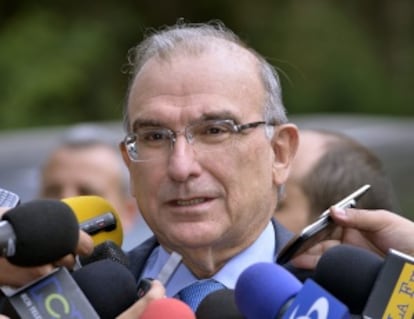Colombia says it won’t accept threats of disclosures from the FARC
Guerrilla leader orders negotiators to release details of secret peace talks in Havana

The peace process between the Colombian government and the Revolutionary Armed Forces of Colombia (FARC) may be in danger over comments made on Tuesday by President Juan Manuel Santos at the United Nations.
FARC leader Timoleón Jiménez, alias “Timochenko,” sent a letter to Santos scolding him for insisting that the guerrilla negotiators need to speed up the peace talks that are being held in Havana.
In his missive released Wednesday, Timochenko said the president’s remarks were “offensive to all of us,” and announced that he had ordered his team to prepare a report on the goings-on at the negotiating table which would break the confidentiality clauses agreed to by both sides.
Representatives from the Santos government and the FARC began meeting privately on November 19, 2012, in Havana to find ways to end the 50-year-old insurgency and to bring the guerrillas into the political process. Talks are set to resume on October 3.
During his address before the UN General Assembly, Santos called on the FARC to speed up the negotiations because the patience of all Colombians “is not infinite.”
The FARC’s reaction is frankly incomprehensible”
“With the exclusive purpose of letting the country and the world know the truth of what is actually going on, I have decided to authorize our representatives in Havana to draft a report for the Colombian people. We have a great duty to fulfill and all this rhetoric only serves to cause more damage, Mr Santos,” Timochenko wrote.
On Thursday, lead government negotiator Humberto de la Calle said that “the FARC’s reaction is frankly, incomprehensible,” and he reminded Timochenko that he must abide by the confidentiality clauses outlined in the rules of peace talks.
In any case, De la Calle said that the government won’t accept any threats over Timochenko´s decision to release details of the secret negotiations. In the end, he said, it will be the Colombian people who will decide whether the peace talks are successful.
In his letter, Timochenko also complained that the government clings on to the six agenda items that were agreed beforehand so much “that they believe that these are the only issues brought to the table that deserve to be considered.”
In response, De la Calle said what hurts the FARC the most is precisely the government team’s adherence to the six-points negotiating agenda – which includes agrarian reform, the FARC's political participation, the end of conflict, drug trafficking problems, reparations for victims and final approval of the agreements.
“That agenda is the backbone of what is occurring in Havana," he said.
After 11 months of talks in Havana, agreements have only been reached on the first point: agrarian reform, while both sides have struggled to find common ground over the FARC’s future political participation once the guerrillas are demobilized. According to analysts, this is the issue that has been causing the greatest tension.
The talks are being brokered by Chile, Venezuela, Cuba and Norway.
Tu suscripción se está usando en otro dispositivo
¿Quieres añadir otro usuario a tu suscripción?
Si continúas leyendo en este dispositivo, no se podrá leer en el otro.
FlechaTu suscripción se está usando en otro dispositivo y solo puedes acceder a EL PAÍS desde un dispositivo a la vez.
Si quieres compartir tu cuenta, cambia tu suscripción a la modalidad Premium, así podrás añadir otro usuario. Cada uno accederá con su propia cuenta de email, lo que os permitirá personalizar vuestra experiencia en EL PAÍS.
¿Tienes una suscripción de empresa? Accede aquí para contratar más cuentas.
En el caso de no saber quién está usando tu cuenta, te recomendamos cambiar tu contraseña aquí.
Si decides continuar compartiendo tu cuenta, este mensaje se mostrará en tu dispositivo y en el de la otra persona que está usando tu cuenta de forma indefinida, afectando a tu experiencia de lectura. Puedes consultar aquí los términos y condiciones de la suscripción digital.








































